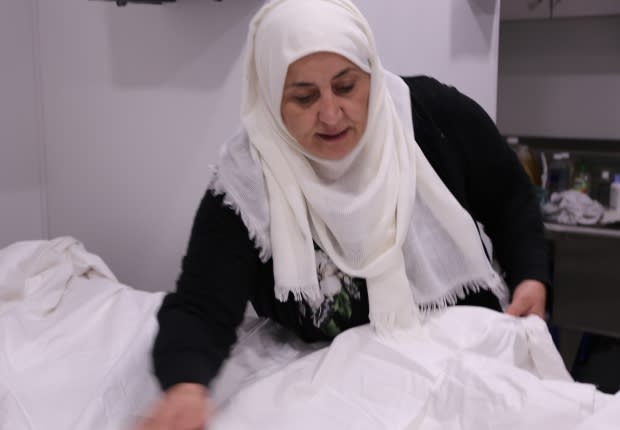Grieving families take comfort knowing traditional burial customs are honoured
Edmonton's Al Rashid Mosque is celebrating the first Muslim woman in Alberta to become a certified funeral director.
Salwa Kadri stepped into the role of funeral director with the Edmonton mosque's Islamic Funeral Services Society this month, more than a decade after she began caring for the deceased.
It's a job that requires understanding Islamic law as well as the needs of families from as many as 60 different ethnic backgrounds.
"You can't expect a person from Lebanon to have the same kind of cultural practices as a person from Africa," Kadri said. "So you have to have a balance to understand what's cultural and what is religious."
The society assists Sunni Muslims from all over northern Alberta when someone they love dies. About 50 volunteers take calls around the clock so that a funeral can be held within a day, whenever possible.
Before Kadri earned a funeral service diploma from Mount Royal University, the society relied on non-Muslim funeral directors to ensure provincial regulations were followed.
"You have a person who is very knowledgeable in laws and regulations and knows the religious aspect of it," said Al Rashid communications director Noor Alhenedy.
"Strengths in both these areas are really crucial to make sure the funeral society runs smoothly without problems."

According to Islamic law, a person should be buried in a grave without a casket and should not be cremated or embalmed.
Kadri has helped wash, shroud and bury hundreds of people since she started volunteering with the society in 2008.
While many traditional Muslim funerals only include men, Al Rashid invites as many people as possible to attend the prayer. Kadri said she attends the majority of funerals held at the mosque.
'Everybody is the same'
Funerals among different Muslim cultures can vary depending on traditions but Sharia (Islamic law) requires that the deceased are always handled with the same care and respect.
"This is one thing that brings all Muslims together is our spiritual practices of how we worship," Kadri said. "We have one Qur'an, one religion and we have one way to do funerals."
First, she washes the body as if that person was preparing for prayer. In Arabic, the practice is known as ghusl.
Next, she bandages the body with strips of plain white cloth and covers them in a kafan, a similar material that wraps around the whole body.
Kadri has done this for people as old as 100 and children as young as nine. She has learned to adapt the customs for people whose bodies have decomposed or were mangled in a car wreck. She has bathed people who weighed nearly 400 pounds.
"Everybody gets the same headstone, everybody gets washed, everybody gets shrouded, everybody goes into the grave without a casket," she said.
"So everybody is treated the same. The rich, the poor, the old, the young — everybody is the same."
Concentrating on families
Beyond caring for the dead, Kadri said she would like to do more for the families left behind.
She plans to introduce a process for pre-arranged funerals to alleviate the stress of setting up a funeral within 24 hours, and she will be hosting a workshop on grief in the fall.
Kadri said she would also like to introduce a system to connect families with grief counsellors.
Caring for families is what motivated her to start volunteering with the Islamic Funeral Services Society in 2008. Kadri said some people still keep in touch, updating her about their lives.
Hiam Abdulrahim from Cold Lake said she still talks to Kadri years after the mosque took care of her mother-in-law's funeral.
Abdulrahim said she does not practice the religion day-to-day and her family would not have been able to provide a traditional funeral without Kadri.
Kadri booked a car to pick up her body and obtained a death certificate in Edmonton, she said.
"She's a kind of mentor and a teacher at the same time," Abdulrahim said. "She always makes sure things are done right and proper."
Alhenedy said Salwa taking on the role as a woman resonates particularly with her.
"In this time of age, you're hearing about a lot of firsts," she said. "It makes me really proud as a woman and as a Muslim woman."

